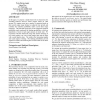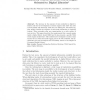APWEB
2004
Springer
14 years 5 months ago
2004
Springer
Web search engines help users find useful information on the WWW. However, when the same query is submitted by different users, typical search engines return the same result regar...
WIDM
2004
ACM
14 years 5 months ago
2004
ACM
Organising large-scale Web information retrieval systems into hierarchies of topic-specific search resources can improve both the quality of results and the efficient use of com...
MIR
2004
ACM
14 years 5 months ago
2004
ACM
In this paper, we propose an autonomous learning scheme to automatically build visual semantic concept models from the output data of Internet search engines without any manual la...
WINE
2005
Springer
14 years 5 months ago
2005
Springer
In this paper, we propose a simple framework to characterize the switching behavior between search engines based on click streams. We segment users into a number of categories bas...
WEBI
2005
Springer
14 years 5 months ago
2005
Springer
Given the large heterogeneity of the World Wide Web, using metadata on the search engines side seems to be a useful track for information retrieval. Though, because a manual quali...
ERCIMDL
2005
Springer
14 years 5 months ago
2005
Springer
Abstract. The increase in the amount of data available in digital libraries calls for the development of search engines that allow the users to find quickly and effectively what ...
CIKM
2005
Springer
14 years 5 months ago
2005
Springer
Finding information about people on the Web using a search engine is difficult because there is a many-to-many mapping between person names and specific persons (i.e. referents). ...
AIRWEB
2005
Springer
14 years 5 months ago
2005
Springer
Web spamming, the practice of introducing artificial text and links into web pages to affect the results of searches, has been recognized as a major problem for search engines. ...
SIGIR
2005
ACM
14 years 5 months ago
2005
ACM
To investigate the nature of people’s understandings for how search engines work, we collected data from 232 undergraduate and graduate students. Students were asked to “draw ...
SIGIR
2005
ACM
14 years 5 months ago
2005
ACM
Search engines represent a key component of Web economy these days. Despite that, there is not much technical literature available on their design, fine tuning, and internal oper...



